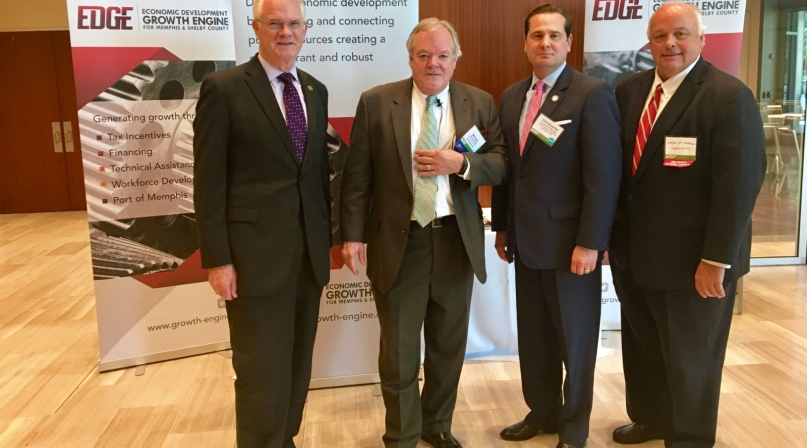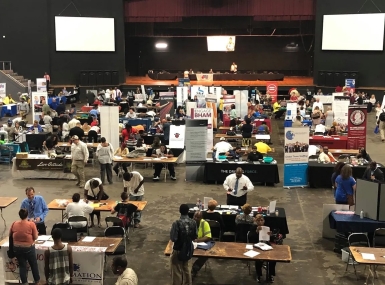RegionSmart Summit in Tennessee explores importance of regional collaboration
Author
Upcoming Events
Related News

RegionSmart examined sustainable transportation planning, manufacturing in the South and retrofitting suburbia
As counties, we are largely defined by political and geographical boundaries, yet the challenges that we face are rarely confined to these parameters. The robust economic development and transit system of a neighboring county or metropolitan area can yield positive dividends and opportunities for surrounding counties.
Conversely, an opioid epidemic, increased criminal activity, and poor health indicators in one county will yield consequences for others.
Regional collaboration is an essential tool in the growth and development of one’s own community. In 2013, with this guiding principle, a cohort of county and municipal mayors, including NACo Board of Directors member and Shelby County, Tenn. Mayor Mark Luttrell founded the MidSouth Mayors’ Council.
“In the first year of RegionSmart, we were attempting to do something bold and frankly unprecedented,” said Mayor Luttrell.
“While our individual counties and municipalities have enjoyed some success over the past several years, we could be missing transformative opportunities if we don’t begin to critically think, plan, and behave as one Mid-South region.”
At the Second RegionSmart Summit, on April 27, more than 300 community leaders, government officials, and citizens from a three-state region gathered in Shelby County, to develop tangible strategies and further explore issues such as workforce development, transportation and land use that impact the region.
For RegionSmart’s second year, we specifically explored concepts such as sustainable transportation planning, manufacturing in the South and retrofitting suburbia.
Former Charleston, S.C. Mayor Joseph Riley served as keynote speaker. Drawing on his experience as a 10-term incumbent, who recently left office in 2016, he shared several illustrations and narratives related to buildings and structures that had been saved during his 39-year tenure.
Riley detailed his city’s decision to buy housing slated for demolition, instead renovating them as affordable houses. “It’s the public realm,” he said of his policies. “It creates a sense of shared citizenship. It gives our citizens a sense of pride.”
Peter Kageyama, author and co-founder of the Creative Cities Summit, explored the emotional engagement with places and why it’s a good thing for people to fall in love with their community. “When pets, plants — even objects — are loved, they thrive,” Kageyama said. “So too with cities. We can argue about the degree, but I think people realize there is at least some value to that. Yes, things have a cost, but they also have a value beyond the purely financial. I’m trying to get people to recognize and be able to discuss that value.”
At the end of RegionSmart, over a dozen mayors gathered on stage to issue a call to action in support of new and distinct regional efforts. Jeff Huffman, Tipton County executive, told the group that “Regionalism is not going to go away. We don’t have a choice …We’ve got a lot of work to do.”
Mayor Luttrell added that “Today’s workforce and major employers are confined to the same boundary constraints of generations past. As government and community leaders, we should strive to gain a more comprehensive understanding and sense of awareness of those efforts impacting the region. Our effectiveness is severely curtailed if we operate in silos. As county mayor, in large part, your success will depend on your ability to work with thc city mayors.”
As county budgets are tightened and projects delayed, collaborating and coordinating resources and services become increasingly important.
Benefits ranging from regional thought and leaner approaches to comprehensive infrastructure planning must be leveraged, but the results are significant. Longterm, region-wide planning is necessary for us to maintain existing services and become absolutely critical as we look to enhancing those services in the future.
Regional entities are ideal vehicles for discussing, debating, and strategically addressing area-wide solutions. County leadership is better than any other government actor to create regional-focused leadership efforts because we are best poised to account for the local cultural, political, and economic factors that make each of our communities unique. It’s a new way of doing business, but the results can be powerful — and the need cannot be understated.
Attachments
Related News

House Passes Historic Outdoor Recreation Legislation
The U.S. House passed the bipartisan EXPLORE Act (H.R.6492) on April 9 to boost outdoor recreation opportunities on public lands and aid local economies

Counties offer a second chance after incarceration
From job fairs and housing programs to educational opportunities, counties offer a second chance after incarceration.
